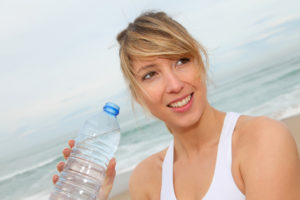What’s The Connection Between Drinking Water And Weight Loss?

Weight loss can be hard and there’s a lot of information around about the connection between drinking water and weight loss. Firstly, let’s get one thing straight. Drinking water is not a magical cure-all for weight loss.
But drinking water can help to regulate what and how much you eat. When you eat the right foods, consume the right drinks and burn more calories than you consume, you will lose weight.
Here are 4 surprising ways that water and weight loss are connected and can help you stop cravings and eat less.
Free Report: 15 Foods To Eat Before & After Your Workouts
Drinking Water And Weight Loss
1. Eat Fewer Calories
Water can help you eat fewer calories than you would if you didn’t drink water before meals. Livestrong notes a study where participants consumed 75-90 fewer calories with two 8oz glasses before dinner per meal. Now consuming 90 fewer calories per meal may not seem like a whole lot. However, if you did this every meal you could lose up to 28 pounds a year. Let’s look at how this is possible.
How Water Helps You Regulate What And How Much You Eat
If you save 90 calories a meal, three times a day, that’s 270 calories every day that you’re not eating. If you do this every day for a week, you’ve not consumed 1890 calories. Continue saving that 90 calories a meal every week for a year, and you’ve saved 98,280 calories. 3500 calories make up approximately one pound. In weight loss, the theory is that a deficit of 3500 calories means 1 pound of weight loss. By saving 98,280 calories you’ve created a pretty big gap, meaning 28 pounds!
On the flipside, if you were to continue eating as normal that 90 calories could be in excess. Therefore, instead of saving yourself you’ve actually gained 28 pounds in a year. All of this weight loss or weight gain is changed by only drinking two 8-ounce glasses of water before each meal.
2. Water Aids Digestion Through Saliva
Digestion starts with saliva. Saliva is made mostly of water. According to Everyday Health, the enzymes in saliva are the beginning of the digestive tract. These enzymes help break down food so that they can be properly digested in the stomach. Without these, food would never be able to be processed in the stomach.
Water also helps break down the fiber. Foods that consist of water-soluble fiber are one of the biggest factors of feeling full after you eat. These foods include oats, legumes (peas, beans, lentils), barley, fruits and vegetables, especially oranges, apples and carrots. If you’ve not had enough water, or are dehydrated, digesting water-soluble fiber becomes almost impossible. Make sure that you are able to digest this food element properly by drinking lots of water.
3. Hunger And Thirst Signals Are the Same
You may be reaching for a snack when what you should be reaching for is a tall glass of water. Many people don’t know how to tell the difference between hunger and thirst, and because we so rarely think about dehydration, we assume that we’re hungry. Next time you’re getting hungry signals from your brain try reaching for a glass of water instead. You may find out that you were just thirsty.
4. Water Soluble Vitamins
One of the reasons that we eat food is to get access to vitamins. Vitamins and minerals are vital to various body functions. Deficits in these minerals and vitamins can cause food cravings in the body. San Francisco Gate tells how the body cannot digest certain water-soluble vitamins that we get from food without enough water in the body.
Water-soluble vitamins are vitamins that can only be absorbed with the aid of water. They include the ‘B vitamins’, like riboflavin that helps your body metabolize carbohydrates, protein and fats and vitamin C that acts as an antioxidant in your body.
These vitamins break down with the water in the digestive tract and then are absorbed into the body. Absorption of these essential vitamins stops when dehydration occurs, or when there is not enough water in the body. When even slight deficiencies are present, you may begin craving additional foods even though you’re not hungry. These cravings are due to vitamin deficiencies and not hunger. So make sure that you have enough water so that you can digest all of your water-soluble vitamins.
15 Foods That Provide Fuel For Exercise
Knowing what to eat and drink throughout the day can have such an immense effect on your ability to focus and concentrate. It can also greatly impact both your short-term and long-term mental health which can lead to an increase in productivity and efficiency.
Your body also needs a certain kind of nutrition in each stage of an exercise workout. Protein, carbs (both simple and complex) and healthy fats all play a role in your body’s fuel for exercise. Download this free report to discover 15 Foods To Eat Before & After Your Workout and why these types of foods are best at both ends of an exercise session.


Pingback: Top 5 Foods To Eat Before A Workout - How To Get Flat Abs Fast
Pingback: How Do You Maintain Your Weight After Weight Loss?
Pingback: How Can I Lose Weight When I'm Always Hungry?
Pingback: How To Deal With Weight Loss Setbacks - How To Get Flat Abs Fast
Pingback: A Simple Guide To Proper Form When Lifting Dumbbells
Pingback: 7 Keys To Transform Your Body And Stop Living An Unhealthy Lifestyle - How To Get Flat Abs Fast
Pingback: Can You Gain Weight By Drinking Diet Soda? - How To Get Flat Abs Fast
Pingback: 3 Weight Loss Foods That Aren’t As Healthy As You Think
Pingback: 4 Diet Changes To Make If You Want To Tone Your Body
Pingback: 10 Nutrients To Eat Post Workout To Speed Up Recovery
Pingback: 7 Psychological Blocks That Can Make It Hard To Lose Weight
Pingback: Can Exercise Alone Banish Belly Fat? - How To Get Flat Abs Fast
Pingback: 6 Tips To Burn Fat With Your Diet - How To Get Flat Abs Fast
Pingback: Eat Less Junk Food by Using Water as Your Weapon
Pingback: Top 10 Diet Success Tips for Women - How To Get Flat Abs Fast